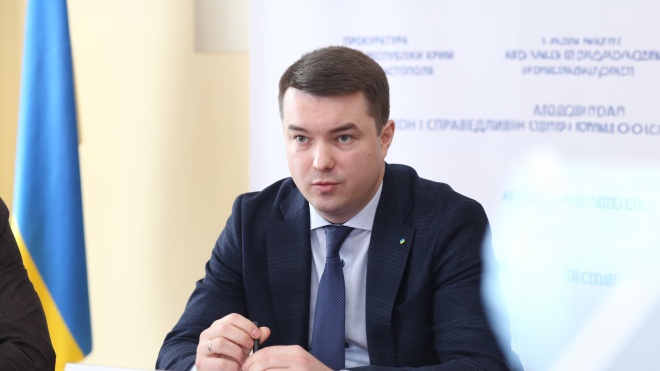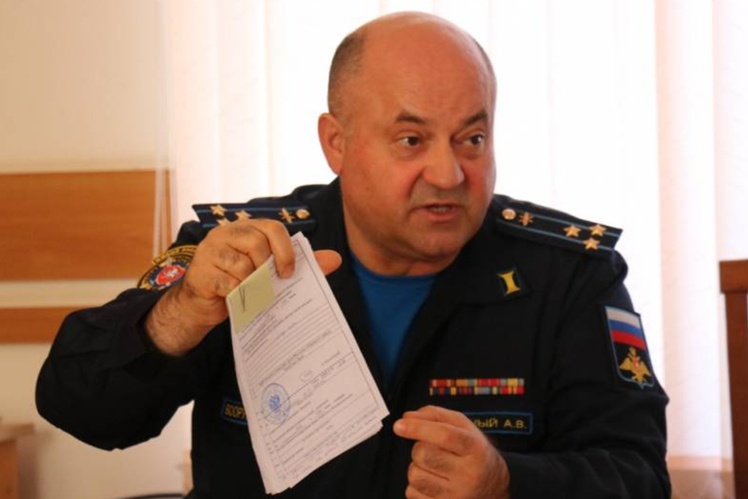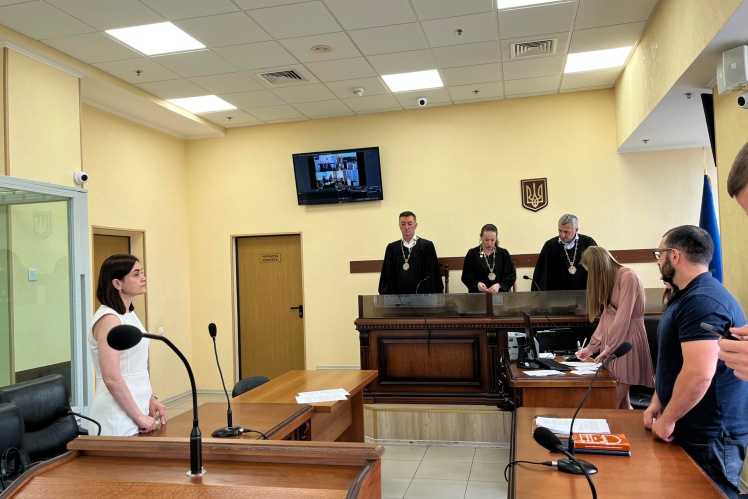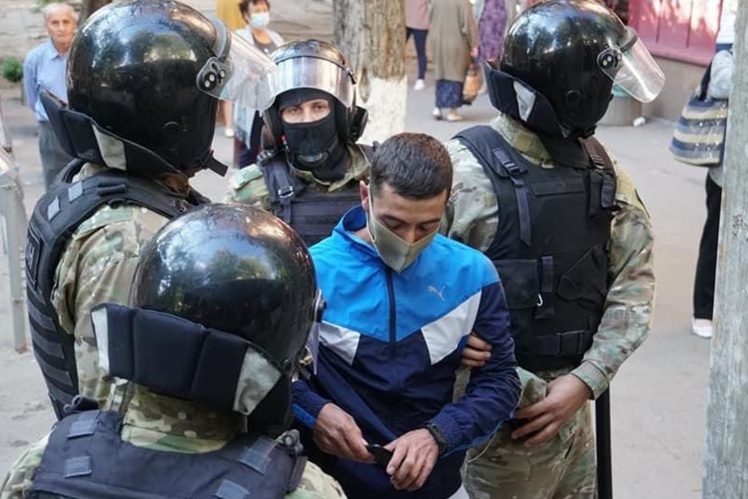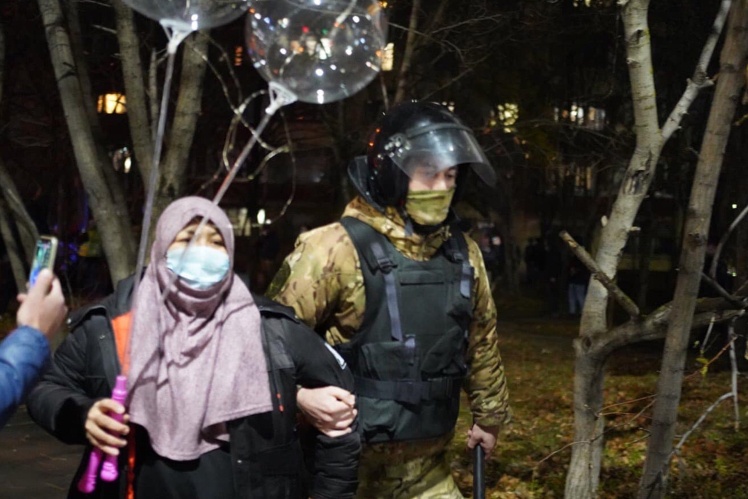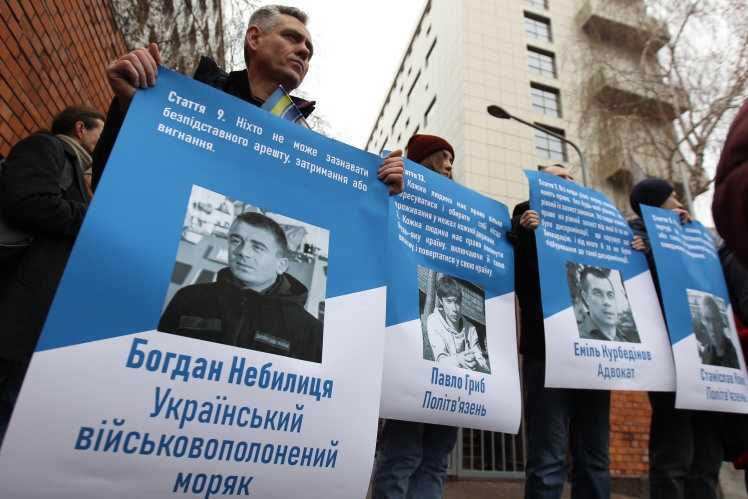In the past two years, the website of the Prosecutorʼs Office of Ukraine has featured a lot of news about sentences for state traitors and war criminals from Crimea. I donʼt remember them being there before a full-scale invasion. What has changed?
Little has changed in the work of the prosecutorʼs office until 2022 and after. But the Ukrainian judges themselves began to treat it differently. Before the full-scale invasion, they frankly did not want to consider indictments against state traitors and war criminals of Crimea. They said that “tomorrow the government will change, we will be brought to justice”, as once Kyiv judges were brought to justice for the verdicts of the Auto Maidan protesters. So why do they need all these [additional problems]?
There were cases when we detained people [who came to the Ukraine-controlled territory] who committed treason or crimes against the foundations of national security in Crimea, sent the indictment to the court, and the judges delayed its consideration. The maximum that could be squeezed out was a suspended sentence. In reality, only individual judges handed down sentences of deprivation of liberty.
Cases about crimes in Crimea are heard in the courts of Kyiv. In the eight years before the invasion, we received verdicts on state traitors in only two courts — Dniprovskyi and Sviatoshynskyi dictrict courts of Kyiv. Then three deputies of the Crimean parliament and a Crimean judge were convicted. In other courts, indictments against the deputies of the Verkhovna Rada of Crimea, deputies of Sevastopol, Crimean judges, former prosecutors and SBU officers who went to work for the FSB have been at the preparatory hearing stage for years.
Does the court have no time frame for considering the case?
There is none. There are reasonable terms, but this is an evaluative concept. After the full-scale invasion, people realized that Russia is the enemy, there is a war going on, and there are state traitors in Crimea. If by 2022 we had four verdicts for treason, in two years of the full-scale war — 83, and the bulk of them are decisions against Crimean judges. Earlier, Kyiv judges had "corporate solidarity" in this matter. Now Crimean judges are convicted not only of treason, but also of war crimes, one of which is illegal deportation.
What kind of deportation?
In 2014, Russia announced a transitional period in Crimea, during which everyone had to obtain Russian passports. Those who didnʼt want to do this had to leave the peninsula voluntarily — or people were deported by court order. The occupant authorities brought people and their belongings to the migration center in Rostov, and then took them to the border between Ukraine and Russia, mainly Kharkiv region. Most of such cases were from 2014 to 2019. Then it started happening less often, because in fact there are no Ukrainian citizens left in Crimea without a Russian passport.
Who else is being convicted of war crimes in Crimea?
In 2023, Oleksandr Kabashnyi, the military commissar of Feodosia city, who carried out mobilization in 2019-2020, was sentenced to eight years in absentia. The Supreme Court of Ukraine confirmed this verdict. Kabashnyi is a citizen of Ukraine. This is the first sentence for violating the laws and customs of war in Crimea. Until 2022, Article 438 of the Criminal Code was like a blank sheet of paper. The majority did not understand it: what are the war crimes, why is there a war in Crimea?
Oleksandr Kabashnyi. Announcement of the decision of the Kyiv Court of Appeal in the case of Oleksandr Kabashnyi. The verdict was upheld.
ark.gp.gov.ua
Frankly, since 2014, nobody needed Crimea. We encountered indifference in the Ukrainian courts, among law enforcement officers and in general among Ukrainians. Crimea is somewhere far away, so it hurts mostly those who live or used to live there. Even colleagues from the prosecutorʼs office had to explain that there are no bombs falling in Crimea, but there is an international conflict there, the Armed Forces of Russia have occupied the territory of Ukraine, and war crimes are being committed.
The realization that there is a war in Ukraine came to the majority after February 24, 2022. Before that, everyone thought that the Crimea-related authorities of the Prosecutorʼs Office of Ukraine were doing something there — well, let them continue to do it.
Did the Russiaʼs FSB start detaining people in Crimea more often for supporting Ukraine after the full-scale invasion? Has all resistance been suppressed?
In Crimea, someone is periodically detained in order to maintain a degree of fear and propaganda that everyone who has a pro-Ukrainian position is an extremist. But this is not a mass phenomenon, as it was before. Currently, people in Crimea are mostly persecuted under the article of discrediting the Russian army, which appeared in Russian legislation in 2022. People are tried for their anti-war stance.
Just like before, journalists, public activists, and representatives of the indigenous people — the Crimean Tatars — are detained and sentenced in Crimea. They continue to persecute members of Jehovahʼs Witnesses religious organization, because it is banned in Russia. Crimean Tatars are accused of sabotage and belonging to the Islamic organization "Hizb ut-Tahrir" which is banned in Russia.
Mass illegal detention of Crimean Tatars in occupied Crimea. Rally in support of Ukrainian political prisoners in Russia.
Facebook; Getty Images / «Babel'»
Did the number of investigations by the Ukrain-controlled Crimean prosecutorʼs office increased after the start of the full-scale Russian invasion?
Yes, because of collaborators. In 2022, an article appeared in the Criminal Code of Ukraine covering legal relations that we could not qualify before, but they existed in Crimea. For example, making business with the occupiers, providing assistance to the aggressor state. This refers to conditional volunteers who collect aid for the Russian army.
We have a total of 3.5 thousand investigations not. If we talk about treason, the number of cases did not increase compared to the period until 2022. Most people committed treason in 2014.
In 2023, the prosecutorʼs office sent to court the case of the murder of Reshat Ametov, a Crimean who, in the first days of the occupation of the peninsula, went on a solitary picket in the center of Simferopol, was kidnapped and killed. Has the court started considering the case?
There have been no court hearings yet. Ametov was kidnapped on March 3. We established that this was done by three people from the so-called "self-defense of Crimea" — two of them are citizens of Ukraine, one is a citizen of Russia, a former Russian military officer. Ametov was last seen alive at the "self-defense" headquarters in Simferopol, most likely, he was kept in the basement and tortured. Later, he was found dead 50 kilometers from Simferopol in a forest strip, on the outskirts of one of the villages.
When Russia established its power verticals in Crimea, the FSB began to illegally detain and torture people. One of its victims, Renat Paralamov, who managed to get out of Crimea after being kidnapped in 2017, said that he was tortured with electric current, a bag with cigarette ashes was put on his head, he was suffocated with a gas mask, and beaten with water bottles. Such torture was applied to all those who resisted the occupation. I have no official confirmation, but according to operational information, in the early years of the Russian occupation of Crimea FSB sent there units that used to torture people in Chechnya during the invasion of Russian troops there.
A large number of FSB officers in Crimea are former employees of the Security Service of Ukraine. And almost all of them are involved in illegal detention of people. The FSB does the dirtiest work with the hands of our mankurts.
Renat Paralamov.
ark.gp.gov.ua
Have you heard about the basement in the FSB building in Simferopol, where Ukrainians are secretly kept? A resident of Kherson, who stayed there for two weeks, told me about it. The man was detained at Russian checkpoints when he tried to leave the occupation via Crimea in 2022. When did this basement appear and is it still working?
I heard about the basement, but I donʼt know when it was built and whether Ukrainians are kept there now. After the invasion, it became extremely difficult to get information from Crimea. Once, the counterintelligence told me that it was easier for them to take a person from near the Kremlin walls and bring him to Kyiv than to get a newspaper for me in the Crimea. The peninsula is maximally saturated with special services, there is total control.
The Russians brought many people to the Crimea when they retreated from the right bank of the Dnipro river. They are kept in secret in the pre-trial detention center. No one knows their names, how many people are there, or what they are accused of. Sometimes, to make it more difficult to find people, they are transported from one pre-trial detention center to another.
Since Soviet times, there has been one pre-trial detention center in Crimea — No. 1 in Simferopol. Now in Simferopol there are also SIZO No. 2 and SIZO No. 8. They were put into operation after the Russiaʼs full-scale invasion in Ukraine. There is information that they are planning to build another pre-trial detention center.
Crimeans arrested for political reasons are kept in the first pre-trial detention center. In the second, there are people who were brought to Crimea from the torture camps in the Kherson and Zaporizhzhia regions. The Russians also use the peninsula as a transit base. Military equipment is smuggled from Russia, and children, kidnapped civilians, and prisoners of war are being deported from Ukraine to Russia. There is little information about SIZO No. 8. It is known that it is managed by the FSB. Maybe Ukrainians are also kept there.
Are there pretrial detention centers and secret FSB basements in Sevastopol?
Everything is concentrated in Simferopol. During the entire time of the full-scale invasion, I remember only one case when a civilian said that he was detained in the Kyiv region and held in Sevastopol.
How did he end up there?
At the beginning of the full-scale invasion, civilians were kidnapped in the north of Ukraine and taken across Russia to Crimea. Why is a mystery to me. But definitely not for no reason. Russians understand very well that Crimea is a closed gray zone in international relations, through which stolen grain, civilian hostages, and prisoners of war can be exported. And itʼs one thing to keep people in Russian pre-trial detention centers, but another in Crimean ones, where there are no human rights organizations and observation commissions.
Everything in Russia is working for the war in Ukraine. After the start of hostilities in the Luhansk and Donetsk regions in 2014, the Investigative Committee of Russia created a large unit to document war crimes allegedly committed by the Ukrainian military. In Ukraine, only in 2019, a unit appeared in the Office of the Prosecutor General of Ukraine, which systematizes war crimes in the east of Ukraine. On the legal front, Russians should not be underestimated.
Until 2022, Ukrainian human rights organizations submitted lists of Crimeans who were tortured and convicted in Crimea to all possible international human rights organizations, but the world hardly reacted to it. At most, the international organizations expressed deep concern. Has anything changed in the two years since the invasion?
It has changed, but it doesnʼt free our people. There was only a formal reaction to the full-scale invasion. In previous years, we sent 13 information notices with evidence of war crimes committed in Crimea to the International Criminal Court. By the end of 2020, the ICC had reviewed them and we expected it will open official investigations. In 2021, this did not happen, and then the full-scale invasion began.
Prosecutor of the Ukrainian administration of Crimea Ihor Ponochovny.
ark.gp.gov.ua
What is the fate of the thirteen submissions on Crimea that the Ukrainian Prosecutorʼs Office submitted to the ICC in 2020? Will they be considered separately from other cases in Ukraine related to the full-scale invasion?
The ICC will not consider them separately. For the International Criminal Court, the situation in Ukraine includes crimes related to the annexation of Crimea, the war in Donbas in 2014-2022, and the full-scale invasion. Investigating the deportation and resettlement of Ukrainian children, the ICC is investigating cases of adoption of Crimean orphans in 2014. At the time of the occupation, more than four thousand children remained in boarding schools and orphanages in Crimea. About ten orphans were taken out and adopted from Crimea in October 2014 through the Russian government program "Train of Hope". We are currently looking for them, although it is difficult due to the secrecy of the adoption. It was possible to identify only a few such children. They live in Russia.
With the help of artificial intelligence, we found children who lived in orphanages and boarding schools in 2014 in social networks. Most of them are already adults, they continue to live on the peninsula. Some of them lived in Russia for a while, and then returned to Crimea.
Translated from Ukrainian by Anton Semyzhenko.
Support the work of Babel by donating: 🔸 in hryvnia , 🔸 Buy Me a Coffee , 🔸 Patreon , 🔸 PayPal: [email protected].
